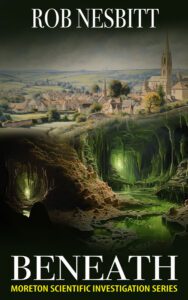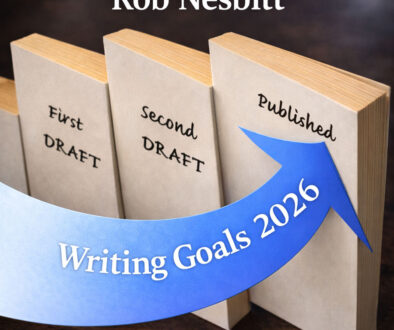So You Want to Write a Book!
If you have a serious ambition to write a book – just remember that it’s not just about writing. Like any craft there is a heck of a lot to other stuff learn, but don’t be put off because it is the most rewarding thing you can imagine. Seeing my first paperback in my hand… a real book that I wrote, was the most wonderful feeling. Here are some tips to get you from first word to first draft…

It is quite a long winded process that requires mental stamina and absolute determination, and even when you have written the book to first draft there will still be a long way to go.
“The first draft is just you telling yourself the story.” – Terry Pratchett
When I started writing my first Moreton Scientific Investigation novel, Beneath, back in 2020, I thought it would be straightforward. After all, I’d been a successful cartoonist for years—how hard could swapping pen and ink for words be?
Turns out, quite hard! But after publishing multiple books in both my U-SAM space opera series and the Moreton Scientific Investigation series, I’ve learned some invaluable lessons about getting that crucial first draft over the line. Whether you’re dreaming of writing the next great alien invasion thriller or crafting your own unique story, these strategies will help you move from dreaming to doing.
 The Reality Check: It’s Harder Than You Think
The Reality Check: It’s Harder Than You Think
When you haven’t written a book before, you assume it’s easy enough to do—until you try it! Even now, after 10 books spanning two different series, I still find first drafts challenging. But I have specific processes and tools that help me get it done, and more importantly, help me create stories that readers genuinely enjoy.
Take my journey with the Moreton Scientific Investigation series. Starting with Beneath, where forensic scientist Ben Sharman and his team face a hibernating alien awakening in caves, I had to learn how to balance scientific detail with page-turning thriller pacing. Each book—from the parasitic aliens in Arrival to the archaeological discoveries beneath Stonehenge in Excavation—required me to master new writing challenges while maintaining the series’ signature blend of humor, character development, and edge-of-your-seat action.
1. Commit to Consistent Writing Sessions
This is the secret weapon that transformed my writing from hobby to published reality. If you get your butt in the chair for consistent periods of time, you will finish a draft.
During my firefighter days, I learned the importance of discipline and routine. I carried that same mindset into writing. Get out your calendar and schedule time for writing, just as you would for any other important commitment. Then turn up for that meeting with yourself, and write. It doesn’t matter if the words aren’t very good—trust me, some of my early scenes in Beneath were absolutely terrible in first draft form. You can clean them up in the editing process, but you need to get black on white and finish that first draft to have something to edit.
The key rule: Don’t do anything else in that time block. No email, no social media, hide your phone – no distractions. Banish everyone else in the house from talking to you. Just get words on the page.
When I was developing the complex alien mythology that spans from the underground creatures in Beneath to the ancient signals buried for centuries in Excavation, I had to protect my writing time fiercely. Those ideas only emerged because I showed up consistently, even when inspiration felt absent.
 2. Create Your Perfect Writing Environment to Write a Book
2. Create Your Perfect Writing Environment to Write a Book
Our brains get used to specific locations for specific things. I discovered this principle when I attended fire officers training courses in Moreton-in-Marsh back in 1991—that small Cotswold town made such an impression that it became the home base for Ben Sharman’s team, in the Moreton Scientific Investigation series, decades later!
For first drafts, I’ve found my sweet spot: The kitchen table very early in the morning when nobody else is awake and its very quiet. Piece of toast and a cuppa and I’m in writing paradise. Early always works for me as my mind later in the day carries all the distracting baggage picked up during the day.
I have also tried writing away from home and all the distractions by hiring a ‘hot desk’ in a local hotel conference facility. That works really well as there is pressure from time constraints as it’s booked for a specific amount of hours.
The point is to find somewhere you can focus completely on your book. Whether it’s a library, an office space, or even just a specific chair in your home that’s reserved only for writing—establish your creative sanctuary.
3. Master the Art of Focused ‘Binge’ Writing
Every productivity expert talks about focused work followed by breaks, and it absolutely applies to writing. I use timed writing sessions to break down the work into manageable pieces. Every author is different. Some do a short stint and have regular breaks. I tend to sit and write a whole chapter at a time with no breaks, so I don’t break my train of thought – but just remember everyone is different so do your own thing.
Setting a timer helps you focus more intensely during the writing period, then ensures you take necessary breaks. You’ll achieve more than if you try to write for hours with no scheduled breaks, especially when you’re building your writing stamina.
Here’s the crucial part: When the timer starts, don’t wait for inspiration. The muse doesn’t arrive when you sit around wishing it would—it shows up when you start creating.
Whether you’re a plotter (like I had to become became when managing the complex alien timeline across five Moreton books) or a pantser who discovers the story as you write, just start putting words down. Get your characters in a setting and write what happens next. So force yourself, no matter what to get into a schedule of writing and before you know it that self-forced writing will become a habit.

4. Embrace Non-Linear Storytelling
This one was a game-changer for me, especially when writing thrillers with multiple point-of-view characters. Don’t feel obligated to write the opening scene first—it’s perfectly fine to jump around and write in any order.
In Arrival, I had to manage Ben Sharman’s investigation team alongside the alien possession victims moving from Wales to Cumbria. I’d often write one character’s arc in one location, then switch to another character entirely, weaving them together later. The key is capturing the scene when it’s alive in your mind, not when the timeline dictates you should write it.
You might get ideas for later chapters while focusing on an earlier one—write those thoughts down and carry on, before they disappear from your mind*. You can always re-order everything during editing.
*Always have something with you to either write or record ideas that pop into your head. I use the Voice Memos App on my iPhone as I often think of something for the story I’m working on when I am nowhere near my laptop. My memory is not great so it’s essential for me to capture an idea before it disappears into the ether.
5. Silence Your Inner Editor (For Now)
At times, you will feel like your words are not clicking. That’s completely normal—we all feel that way! Sometimes they actually are terrible, and that’s okay too.
When I was writing the complex scientific explanations in Transformation, where the team investigates alien-induced deformities that take them from London to Nevada, my first draft read like a boring textbook mixed with a confused travel guide. But I kept writing, knowing I could fix the pacing and clarity later.
You have the editing process to help you clean up the mess, but for now, just get the words down. After all, you can’t edit a blank page, but you can absolutely transform a terrible first draft into something compelling.
Some authors self edit as they go along, which may work for some. I found that this was just waste of time and counterproductive. I wait until I have completed a few chapters before reading it back and tweaking. This has a couple of benefits – to improve while it’s fresh in your mind and also keeps you reminded of the storyline. I found it beneficial to try and complete the first draft in as short a time as possible, because if you leave it between sections, the momentum starts to stall and you start to make stupid errors such as inconsistent characterisation and dodgy continuity.
6. Track Your Progress
A novel can feel daunting, especially when you’re staring at that blank page wondering how you’ll ever create something as complex as, say, a series spanning hibernating aliens to archaeological mysteries beneath Stonehenge.
But writing a book is just a series of sentences gathered into chapters collected into book form. If you manage even one sentence, you’ve taken a step on the journey.
I use Scrivener to write all my books, and it has a Project Targets section where I can set and track word count per session. This visual system makes a huge project feel manageable,
Whether you use spreadsheets, wall charts, or apps, find a way to track your progress. Seeing those daily victories add up will keep you motivated through the long haul.
When Is a First Draft Actually Finished?
My definition of a first draft is a version of your book that can be read end to end and stands as a coherent whole. It shouldn’t have notes like “fill this in later” or “write fight scene here” scattered throughout.
Yes, it will be rough. The alien technology in my first draft of Excavation was inconsistent and the character motivations were murky – as rough as a badgers rear end! But I had a complete story that I could then shape into something much stronger through editing.
Think of your finished book draft as a sketch, that will be transformed into a work of art later. All the structure is in place waiting for the editing paintbrush to convert the sketch into a masterpiece.
From Firefighter to Published Author: You Can Do This
My transition from firefighter to cartoonist to novelist taught me that creative skills are transferable, but each medium has its own challenges. When I published Beneath in July 2023, followed by Arrival in November 2023, Transformation in August 2024, and Excavation in 2024, with Legend coming in November 2025, I realized something important: consistency beats perfection every time.
The Moreton Scientific Investigation series has taken readers from Welsh caves to Stonehenge to Loch Ness, and each book taught me something new about writing. But none of it would exist if I hadn’t committed to finishing that first terrible, wonderful, essential first draft of Beneath.
Write a Book – Your story is waiting to be told. Whether it’s science fiction like my U-SAM space opera series, science thrillers like Moreton Scientific Investigation, or something completely different, the principles remain the same: schedule the time, find your space, start writing, and keep going until you type “The End.”
The world needs your unique voice and story. Now stop making excuses and go write that first draft. Ben Sharman and his team didn’t save the world from alien invasion by waiting for the perfect moment—they got to work. And so should you.
Ready to start your writing journey? The hardest part is beginning, but as I learned while creating five books about a forensic scientist fighting alien threats across Britain, every published author started with the same blank page you’re facing right now.


